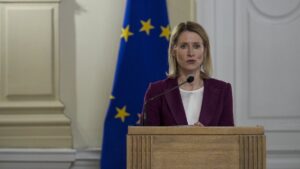Chancellor-in-waiting Friedrich Merz announced Wednesday that the Christian Democrats and Social Democrats have agreed to adopt a stricter approach to irregular migration in their coalition deal.
At a joint news conference in Berlin with coalition partners, Merz said the agreement would establish a “strong” government “capable of taking action” in response to mounting domestic and international challenges.
“We will embark on a new course in migration policy. We will better organize and manage, with the aim of largely ending irregular migration,” he said. “There will be controls at national borders and also returns of asylum seekers at the border. We will intensify deportations, end voluntary admission programs, and suspend family reunification.”
The veteran conservative politician announced plans to reverse citizenship law reforms enacted by the previous government, ending the path to German citizenship after three years of residency. Under the new rules, migrants will only be eligible for naturalization after five years of successful integration.
Merz also outlined measures to strengthen domestic policy by increasing police powers and expanding digital surveillance capabilities of security authorities. He also announced the creation of a “Federal Security Council” within the chancellery and a national crisis team to better coordinate analysis and response to crisis situations.
Conservative leader Merz is under increasing pressure as recent opinion polls show his Christian Democrats (CDU/CSU) have fallen to 24%-their lowest level in three years. At the same time, the far-right Alternative for Germany (AfD) party has reached its highest-ever polling numbers at 25% support, marking a rise of three percentage points since March.
The AfD’s surge stems from widespread voter frustration with mainstream parties and the prolonged government formation process. Merz’s alliance, which had campaigned on stricter immigration controls and economic reforms, has struggled to deliver concrete results during weeks-long coalition negotiations with Social Democrats following the February elections.
After Wednesday’s agreement, the draft coalition deal between the CDU/CSU alliance and SPD requires approval from relevant party bodies and delegates. The Social Democrats plan to hold a membership-wide vote, while the Christian Democrats will decide through a small party conference. If approved, the German parliament could elect Merz as the new chancellor on May 7.




















































Be First to Comment